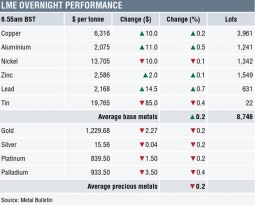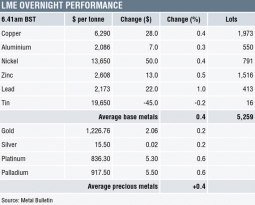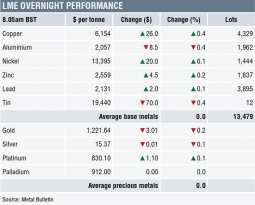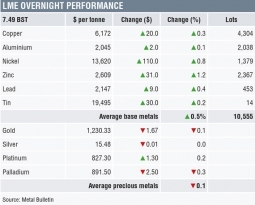Gold and silver prices are little changed this morning at $1,283.70 per oz and $16.55 per oz respectively, although they fell 0.8% and 1.8% on Wednesday, which was surprising given North Korea’s missile test. The platinum group metals are up either side of 0.5% this morning, but they too were weaker on Wednesday, falling by an average of 0.8%.
Gold prices pulled back from the top of their range on Wednesday, the fact they did despite the pick-up in geopolitical tension is surprising. Platinum and palladium prices consolidated in line with gold’s performance, but selling in silver pushed prices below support, making the metal look particularly weak. Given the nervousness in tech stocks, the pick-up in geopolitical tension and wild gyrations in bitcoin, we would not be surprised to see some haven buying return to gold.
Base metals prices on the London Metal Exchange are split this morning, Thursday November 30, with copper, aluminium and lead prices up between 0.2% and 0.4%, with copper at $6,760 per tonne, while the rest are weaker with nickel, zinc and tin prices down by 1%, 0.5% and 0.4% respectively.
Volume has been strong with 12,675 lots traded as of 06.46am London time.
This follows a mixed performance on Wednesday that saw aluminium prices drop by 2.2%, copper prices weaken by 0.8% and zinc prices slip by 0.1%, while nickel prices were up by 0.4%, lead prices strengthened by 0.3% and tin prices were little changed.
On the Shanghai Futures Exchange today, the base metals are generally weaker, down by an average of 0.7%. Zinc and lead prices are little changed, while the rest are weaker, ranged from a 1.9% fall in aluminium to a 0.5% drop in nickel. Copper prices are off by 1% at 52,670 yuan ($7,993) per tonne. Spot copper prices in Changjiang are down by 0.9% at 52,440-52,740 yuan per tonne and the LME/Shanghai copper arbitrage ratio is firmer at 7.79, compared with 7.78 on Wednesday.
In other metals in China, iron ore prices are up by 3.3% to 522 yuan per tonne on the Dalian Commodity Exchange. On the SHFE, steel rebar prices are also up by 3.3%, gold prices are down by 0.7% and silver prices are off by 2.1%. Given the strength in iron ore and steel rebar, combined with the stronger purchasing managers’ index (PMI) data, we are surprised the base metals are under so much pressure.
Equities in Asia this morning are generally weaker, the exception is the Nikkei that is up by 0.57%, while the rest are lower: Kospi (-1.45%), the Hang Seng (-1.51%), the CSI 300 (-1.34%) and the ASX 200 (-0.69%). Some of the weakness is on the back of a sell-off in some US technology companies that saw the Nasdaq fall 1.27%, while the Kospi is down following an interest rate rise. While the Nasdaq may have been under pressure on Wednesday, the Dow Jones closed up by 0.44% at 23,940.68. Meanwhile in Europe, the Euro Stoxx 50 closed up by 0.18% at 3,589.91.
The dollar index at 93.17 is getting some lift as it looks as though some progress is being made on US tax reform, which is probably also why the Dow managed to ignore the weakness in the Nasdaq. The euro at 1.1870 is consolidating, the yen at 112.20, is weaker, which is probably why the Nikkei is also bucking the trend in Asian equities this morning, and the Australian dollar at 0.7583 is little changed. The sterling is strong at 1.3462 on the back of Tuesday’s breakthrough offer on the Brexit bill.
The yuan at 6.6100 is slightly weaker but it seems to be consolidating, while the other emerging currencies we follow are consolidating having been strengthening of late.
Today’s economic agenda is extremely busy – China’s manufacturing and non-manufacturing PMI beat expectations, while Japan’s housing starts fell more than expected. Data out later includes: German retail sales, German, Italian and European Union unemployment data, French, Italian and EU consumer price index (CPI), US initial jobless claims, personal income, spending, PCE prices and Chicago PMI. In addition, US Federal Open Market Committee members Randal Quarles and Robert Kaplan are speaking.
Base metals prices are on a back footing, most metals are holding above support levels, suggesting consolidation, but aluminium and nickel prices have broken below support levels so are showing more weakness. We wait to see if strength in China’s steel sector, combined with better than expected Chinese PMI data is enough to instil confidence. For now we would let theses pullback run their course, but would be on the lookout for bargain hunting.
Metal Bulletin publishes live futures reports throughout the day, covering major metals exchanges news and prices.
The post Metals Morning View: Metals under pressure despite good Chinese PMI data appeared first on The Bullion Desk.
Read More
Source: Bullion Desk News








